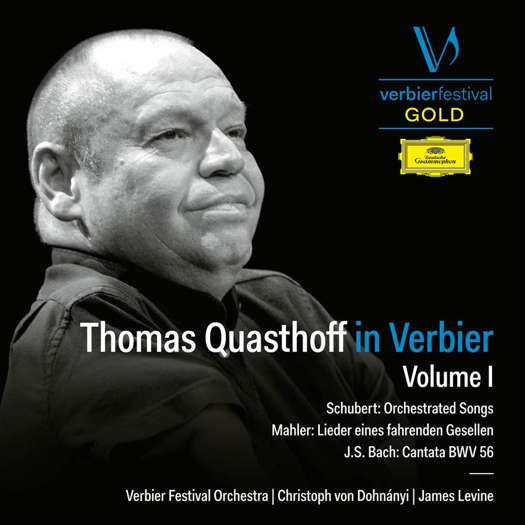 MET STARS: From 2002 until 2021 the late Maria Nockin reported from Arizona, mostly on live opera productions.
MET STARS: From 2002 until 2021 the late Maria Nockin reported from Arizona, mostly on live opera productions.

Subliminal Pedagogy
JOHN DANTE PREVEDINI listens to Thomas Quasthoff singing Schubert, Mahler and J S Bach at Verbier
'Taken within the context of Verbier, this album documents just as effectively his gift for pedagogical modeling as it does his vocal virtuosity.'
Thomas Quasthoff in Verbier (Volume 1) is the recent release from Deutsche Grammophon featuring a compilation of performances by the German bass-baritone Thomas Quasthoff with the Verbier Festival Orchestra, recorded over the course of Quasthoff's relationship with the eponymous annual summer festival in Verbier, Switzerland since his first appearance there in 2003. The fourteen-track, hour-long release is available in digital format only, and the accompanying virtual liner notes can be accessed directly from the label's website.
According to the Verbier Festival's official webpage, 'the Festival's mission is to build a community of exchange between great masters and young artists from all over the world and to be a leader in its field by providing meaningful music education programmes'. To this end, the highly respected international festival has been offering a 'blend of events, both large-scale and intimate' (including concerts, rehearsals and master classes), each summer since its inception in 1994. Considering Quasthoff, whose work I have long admired for its unusual breadth and sensitivity across various musical disciplines (he is well known as an interpreter of Schubert lieder, a vocal coach and a jazz singer alike), this release seems to me a welcome retrospective of an extraordinary educator thriving in his element.
Listen — Schubert, orchestrated by Offenbach: Ständchen (Schwanengesang)
(4863954 track 4, 0:40-1:10) ℗ 2022 Deutsche Grammophon :
The album opens with five orchestrated examples of Schubert lieder: Tränenregen from Die schöne Müllerin (orchestrated by Webern), Der Wegweiser from Winterreise (orchestrated by Webern), Memnon (orchestrated by Brahms), Ständchen from Schwanengesang (orchestrated by Offenbach) and Erlkönig (orchestrated by Reger). These are followed by the four movements of Mahler's Lieder eines fahrenden Gesellen, and the album closes with the five movements of the J S Bach cantata Ich will den Kreuzstab gerne tragen.
What strikes me about this album is not simply the breadth of Quasthoff's mastery of vocal technique and expressive artistry across the idioms of these various repertorial worlds; this fact is already well established about Quasthoff and, at this point, goes without saying. Rather, what I find fresh and novel about this release is its curation of Quasthoff's efforts to present this diverse repertoire for educational purposes. Taken within the context of Verbier, this album documents just as effectively his gift for pedagogical modeling as it does his vocal virtuosity.
To give one example, consider the sense of ensemble scale and balance. To perform the Schubert lieder (albeit in a fully orchestrated form) requires very different demands for maintaining vocal-instrumental balance as a bass-baritone soloist than is the case in performing the Mahler lieder.
Listen — Mahler: Wenn mein Schatz Hochzeit macht (Lieder eines fahrenden Gesellen)
(4863954 track 6, 0:17-0:47) ℗ 2022 Deutsche Grammophon :
Likewise, to give another example, the technical requirements of phrasing and rhythmic momentum are drastically different regarding both of these composers' lieder compared with the melismatic passages of the Bach cantata, etc. The programming and execution of the repertoire on this album thus serve to suggest how other teachers in Quasthoff's position might use repertorial selection to illustrate the range of skills expected from a solo bass-baritone of similar training. Granted, this compilation is condensed from two decades' worth of Verbier seasons, but the richness of the resulting curation's instructional utility nonetheless remains as coherent as if it were deliberately and holistically conceived.
Listen — J S Bach: Ich will den Kreuzstab gerne tragen (Cantata, BWV 56)
(4863954 track 10, 0:37-1:07) ℗ 2022 Deutsche Grammophon :
To conclude, while the album does not literally showcase Thomas Quasthoff in the context of a masterclass, it does document him leading by example through his interpretation of a remarkable array of repertoire that defines the expected terrain of his field. Furthermore, it does so along technical, historical and expressive parameters alike. A release like Thomas Quasthoff in Verbier (Volume 1) could therefore only truly be possible as a product of a festival like Verbier, a reoccurring global musical event which is both educational in nature and virtuosic in ambition. I await the second volume with anticipation and interest.
Copyright © 23 December 2022
John Dante Prevedini,
Connecticut, USA

CD INFORMATION: THOMAS QUASTHOFF IN VERBIER (VOLUME 1)
RECENT CLASSICAL MUSIC CD REVIEWS



